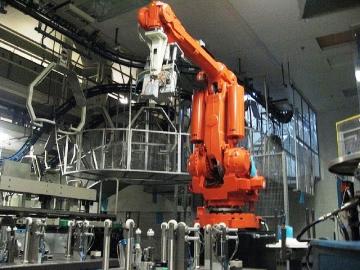
Section Branding
Header Content
Analysis: President-elect Trump's tariffs risk raising consumer prices, layoffs
Primary Content
LISTEN: If President-elect Trump succeeds in enacting his promised tariffs, what would that mean for the economy and your wallet? GPB's Peter Biello speaks with Sina Golara of Georgia State University on the subject.

President-elect Donald Trump has promised to implement an at least 10% tariff on all imported goods and a 60% tariff on goods from China. If he's able to enact them, how would those tariffs impact the economy overall and, specifically, individuals? Sina Golara, assistant professor of supply chain and operations management at Georgia State University's Robinson College of Business, has studied how tariffs ripple through the American economy. He spoke with GPB's Peter Biello.
Peter Biello: You've written that tariffs can provide short-term relief to some parts of the economy, as well as a psychological lift to the public. But the politicians should use tariffs with caution. Why? Why should they use them with caution?
Sina Golara: Essentially, because it brings politics into an otherwise economic matter. When businessmen are allowed to operate with more freedom, they can choose optimal business activities, optimal mix of things to produce and import. But when politics get in the way, the objective kind of deviates from economic value and economic optimization.
Peter Biello: And you've studied how presidents have used tariffs. Can you talk a little bit about how presidents in the past 50 years or so have used them?
Sina Golara: In a nutshell, typically tariffs are used as a fast and quick tool to solve specific shortages of domestic industries. Whenever an industry that is deemed a strategic or too important of falls short, governments, especially the U.S., come in and try to block the entry of foreign goods or make it difficult. So in these cases, what we have learned over the years from more than a century of economic analysis is that typically these tariffs don't lead to a lot of positive results. It's not impossible, but it's typically negative on the net.
Peter Biello: Have some tariffs actually yielded long-term benefits? And if so, what were the qualities of those tariffs that enabled long-term success?
Sina Golara: Yeah. So once you impose tariffs, that creates revenue for the government, what happens next all depends on what is done with that money. If that money is then returned to that industry or some other industry for investment in an area where they are really, really lacking and this investment will generate additional productivity down the road, these negative consequences that we talked about could be negated. So it's not a guaranteed negative result. But the problem is you depend on very good allocation of those resources after that.
Peter Biello: What we've been describing are tariffs that are limited to specific industries. But what happens when there is a broad tariff applied not to the kind of item necessarily, but to the location of its production, like China? I understand there's a tariff on Chinese products right now, but under the next administration, the goal is to increase those tariffs. What do you see as the impact of that kind of tariff?
Sina Golara: Yeah. So basically it's important to understand tariffs are directly imposed not on China, but on importers from China. Tariffs are essentially a tax on those companies. If they try to absorb the costs themselves, no one else feels it except their profitability goes down and they will probably have to lay off workers. And that's how you get the negative consequences. But if the result of that is these companies try to, for example, switch to another country and if there is good replacement, then the American importers wouldn't feel that much of a negative effect; a little bit of cost, but not as much as they could have in the absence of an alternative. So that would be a good scenario. Alternatively, these American importers cannot find any good replacement and then they just have to produce less. They have to absorb more costs, pass on the costs to consumers, which is definitely going to be part of the consequences we'll see. And that will cause inflation. That will cause less jobs in those industries. And then a long-term relationship that's been there between the American importer and the Chinese exporter is going to be damaged permanently.
Peter Biello: Are you saying then that it's likely that rather than American importers finding exporters other than Chinese exporters, that's less likely than them simply increasing prices and then passing on that price increase to the American consumer?
Sina Golara: It all depends on the specifics, right? When you think about, for example, electronics, we are importing 70% of our electronics from China. It would be very, very difficult to find good replacements. So you should be seeing quite a bit of increase in prices. Many companies are — don't have enough margin to kind of absorb a sudden increase in their prices. Remember, the proposed tariffs are supposed to be 60% on Chinese goods. That will be an additional $250 billion of costs for American importers. So the immediate effect actually would be to raise the prices and try to sort of cut costs —some layoffs — and then, over time, try to find better replacements or maybe even move production to the country and use internal — use domestic suppliers.

